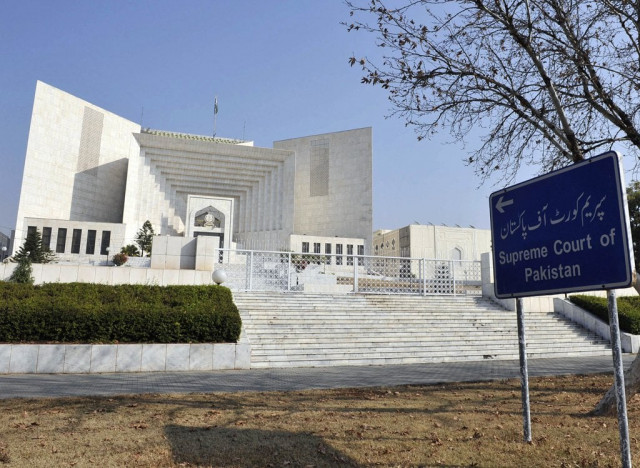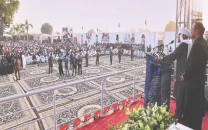SC to take up issue of new LHC benches next week
Petitioner challenges high court’s decision to not set up additional benches

The Supreme Court of Pakistan. PHOTO: AFP
In December last year, the Pakistan Bar Council (PBC) executive member Raheel Kamran Sheikh had filed a constitution petition under Article 184 (3) of the Constitution requesting the SC to set aside the LHC decision in the full court meeting held from July 15 to July 17, 2016 and issue appropriate directives for the establishment of new benches for the enforcement of the fundamental rights of the citizens.
However, the SC registrar’s office had returned petition raising objections.
Now the matter has been fixed before a two-member bench, comprising Justice Umar Ata Bandial and Justice Ijaz ul Ahsan, which will take up the case on October 22. Interestingly, both members of the bench have also served as the LHC chief justice.
The petitioner has argued that the decision on such an important issue was arbitrary and discriminatory and lacked transparency. “The decision is discriminatory for members of the legal fraternity practicing in Faisalabad, Gujranwala, Dera Ghazi Khan, Sargodha, and Sahiwal,” the petition read.
“Without any reasonable classification, it also undermines their prospects of professional development while residing in those divisions when compared to such professionals residing at Lahore, Multan, Rawalpindi or Bahawalpur thus forcing them to travel long distances or migrating to the cities where the high court is located,” it added.
The petitioner stated that during the last month, different district bar associations had resorted to strikes, thereby severely affecting the dispensation of justice.
“The matter [is] of great public importance involving enforcement of a number of fundamental rights contained in Chapter I of Part II of the Constitution." The petition further read that justice could no longer be treated as something at the disposal of the rich and powerful.
"It cannot serve as a tool of oppression in the hands of a few any longer. The foundation of justice is inherently democratic: designed to serve the masses and must, therefore, be made affordable and accessible to all without discrimination.
“Any attempt to curtail or restrict access to justice and centralise it is destined to destroy the very notion of the rule of law, one of the key edifices upon which the foundation of our very state rests.”
The LHC is not the only court of constitutional jurisdiction, but also a court of original appellate and revisional jurisdiction, both on criminal and civil sides.
Currently, the LHC has three benches established in Multan, Rawalpindi, and Bahawalpur whereas the provinces of Khyber-Pakhtunkhwa and Sindh, which have one-third and one-half the population size of Punjab respectively, have an equal number of benches.
Not only the size of the population of Punjab is three times that of K-P and twice that of Sindh but the total number of cases filed and pending in the province are also many times those filed in the other two provinces.
Likewise, a comparison of the population within the province of the Punjab shows that Faisalabad is the second most populous division of the province whereas the populations of Gujranwala, Dera Ghazi Khan, and Sargodha divisions are not very different from those of Rawalpindi and Multan divisions and population of Sahiwal division is comparable to that of Bahawalpur division.
There is no constitutionally valid justification or reasonable classification available for discrimination against the people of Faisalabad, Gujranwala, Dera Ghazi Khan, Sargodha, and Sahiwal Divisions while refusing to have benches of the high court there, the petitioner argued.
In order to file cases and attend hearings, litigants and their counsels from these divisions have been burdened with traveling great distances and bearing costs of boarding or lodging and transportation. It's also a time-consuming exercise. In many cases, matters are adjourned.
“The litigants are constrained to engage advocates stationed at Lahore or other divisions where benches have been established, for higher fees that are commensurate with their higher costs of living and practicing,” the petition read.
“Besides restricting the right to choose a counsel and making access to justice more expensive and less expeditious, a number of other fundamental rights embodied in Chapter I of Part II of the Constitution are at an obvious risk of violation.
“Additionally, the prevalent state of affairs is promoting 'centralisation' and 'elitism' which are adversely affecting the rule of law and undermining the role thereof in society.”
The petitioner stated that the decision taken by the LHC in the full court meeting was contrary to the letter and spirit of the Constitution and violated the fundamental rights of the citizens.



















COMMENTS
Comments are moderated and generally will be posted if they are on-topic and not abusive.
For more information, please see our Comments FAQ